Police can stop you even if you've done nothing wrong

Image source: http://www.infowars.com/ap-photo-checkpoint-cops-point-guns-at-americans-heads/
Police officer may stop and search drivers who have done absolutely nothing wrong. In an 8 to 1 decision Monday, the US Supreme Court ruled that a police officer can be wrong about a traffic law being violated, but the stop will be upheld as valid as long as he the officer's mistake was "reasonable."
Heien vs. North Carolina Ruling: http://www.supremecourt.gov/opinions/14pdf/13-604_ec8f.pdf
“To be reasonable is not to be perfect,” Chief Justice John Roberts wrote. “And so the Fourth Amendment allows for some mistakes on the part of government officials, giving them ‘fair leeway for enforcing the law in the community’s protection.’”
Roberts wrote that the ruling “does not discourage officers from learning the law,” because the Fourth Amendment only covers “objectively reasonable” errors from police.
Justices Elena Kagan and Ruth Bader Ginsburg filed separate concurring opinions. Justice Sonia Sotomayor filed the only dissent, arguing that the ruling meant “further eroding the Fourth Amendment’s protection of civil liberties” at a time when that protection has already been deteriorated.
"An officer might, for example, stop a motorist for traveling alone in a high-occupancy vehicle lane, only to discover upon approaching the car that two children are slumped over asleep in the back seat," Chief Justice John Roberts wrote. "The driver has not violated the law, but neither has the officer violated the Fourth Amendment. But what if the police officer's reasonable mistake is not one of fact but of law?"
"Giving officers license to effect seizures so long as they can attach to their reasonable view of the facts some reasonable legal interpretation (or misinterpretation) that suggests a law has been violated significantly expands this authority," Justice Sotomayor wrote. "One wonders how a citizen seeking to be law-abiding and to structure his or her behavior to avoid these invasive, frightening, and humiliating encounters could do so."
"By refusing to hold police accountable to knowing and abiding by the rule of law, the Supreme Court has given government officials a green light to routinely violate the law," said Rutherford Institute president John W. Whitehead.
The Supreme Court has now held that they are the arbiters of the law, with the only condition being that they can craft a half-baked, phony, facile excuse for why they got the law wrong. The new test for “reasonableness” under the Fourth Amendment is how good a spin the prosecution and cops can offer for mistakes. As it turns out, this is the one thing that they’re exceptionally good at.
Rutherford Institute's Amicus Brief in Heien vs. North Carolina: https://www.rutherford.org/files_images/general/06-17-2014_Heien_Brief.pdf
http://www.nbcnews.com/news/us-news/supreme-court-says-police-mistakes-can-still-lead-valid-arrests-n268591
http://blog.simplejustice.us/2014/12/16/heien-v-north-carolina-close-enough/#more-23081


